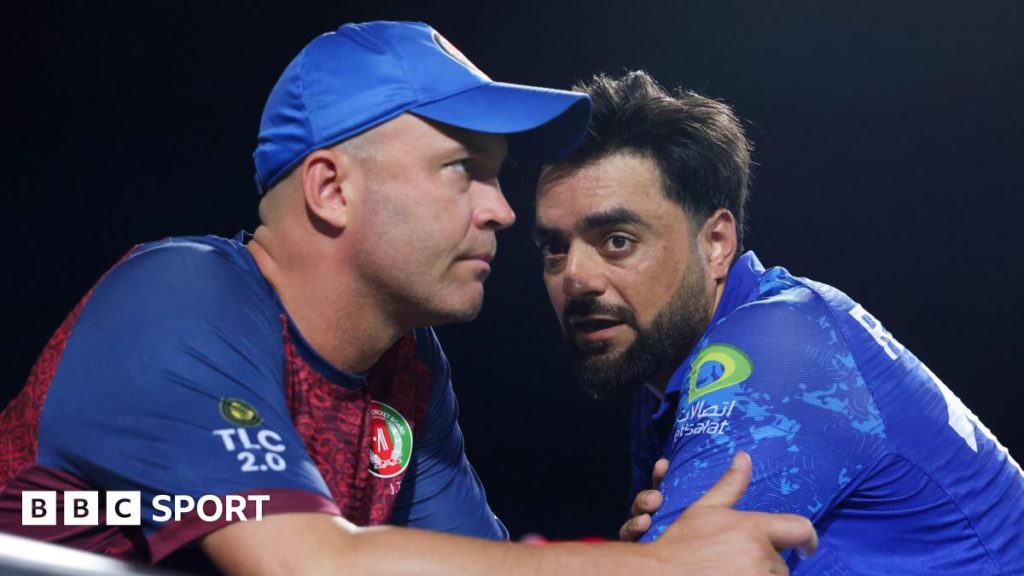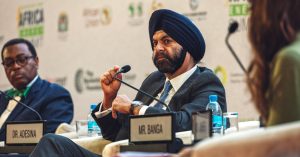Trott has coached Afghanistan since 2022 but still lives in Birmingham. He travels when the players meet for camps in the United Arab Emirates (UAE), which is home to their main training base and hosts many of their fixtures.
The majority of the players live in Afghanistan and play in the domestic cricket leagues.
Under Taliban rule, there has been an assault on women’s rights. Women have been banned from parks and universities. The Taliban also raided the homes of female athletes and many women’s cricketers fled Afghanistan for their safety.
Some of Afghanistan’s highest profile men’s players, including superstar leg-spinner Rashid Khan, have spoken out against the issues.
The men’s team has been allowed to continue to compete on the world stage, despite the banning of its women’s team being an apparent breach of International Cricket Council (ICC) regulations.
“These guys are brave,” Trott said. “They know the difference between right and wrong. It is a real tricky situation for them.
“They know who they are playing for and representing.
“We work hard to bring joy to the country and the guys are passionate, brave and proud of being able to do that, but knowing full well that there are things that are not correct.”
Asked if his side could bring change in Afghanistan, Trott said: “I don’t know but I hope it could.
“This side has that ability at the moment.”
The Afghan female cricketers who fled to Australia played a match there last month. They have said they are “proud” of the men’s team but wanted to be treated the same.
In January, a cross-party letter, signed by nearly 200 UK politicians, was sent to the England and Wales Cricket Board (ECB) calling for England to refuse to play the match.
The ECB has been critical of the ICC’s response, calling for it to take unified action, but when that was not forthcoming agreed the match would go ahead.
In a statement on Tuesday, Amnesty International urged England’s players to speak up for women in Afghanistan.
“The least Wednesday’s teams can do is ensure the entirely subjugated women and girls of Afghanistan are on the minds of audiences around the world, and ensure the match doesn’t give the Taliban a free propaganda boost,” said Amnesty UK’s head of campaigns Felix Jakens.
England captain Jos Buttler, who has spoken to Afghanistan all-rounder Mohammad Nabi about the issue, said he was pleased the match would go ahead because a boycott “would not have the desired impact”.
“I am very sad for the women and girls in Afghanistan who are going through a very tough time at the moment,” added Buttler.
“We are all very aware of that. We hope the game of cricket they love watching and we love playing will give some hope.”
Trott was born in South Africa, which was banned from the global sporting stage because of the apartheid regime. In contrast, the ICC’s stance is that the Afghanistan team should not be punished for government policy.
“I can see the world’s concern,” Trott said. “I am concerned. I have daughters who play cricket.
“I am proud of where I come from and the change the country made for the betterment of everybody. Hopefully one day I can see that in Afghanistan.”
After defeats by Australia and South Africa respectively, both England and Afghanistan will likely have to win both of their remaining matches to progress to the semi-finals.
England are expected to make one change for Wednesday’s match in Lahore after bowler Brydon Carse was ruled out of the tournament with a toe injury.
Rehan Ahmed has been called up in his place, but the leg-spinner is not expected to arrive in Pakistan until Wednesday so Jamie Overton is most likely to replace Carse.








